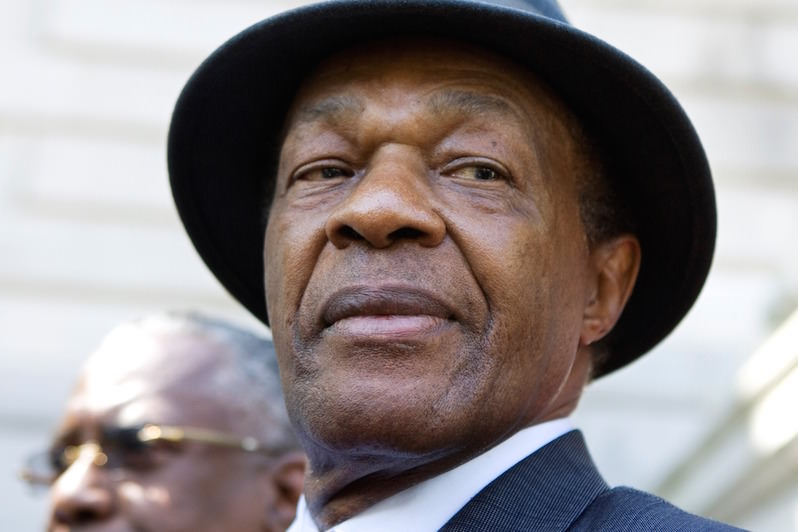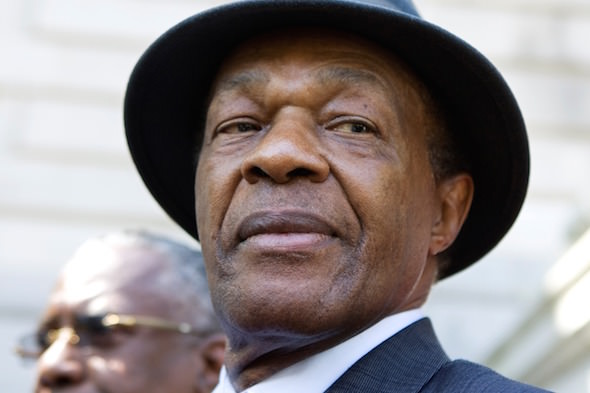Former D.C. Mayor Marion Barry Jr. Dies at 78
Marion Barry Jr., who began his career in public service during the civil rights era and spent four terms as mayor of Washington, D.C., died late Saturday night in his hometown at age 78.

Former District of Columbia Mayor Marion Barry attends a news conference on the steps of Washington’s City Hall in 2009. AP/Manuel Balce Ceneta
Marion Barry Jr., who began his career in public service during the civil rights era and spent four terms as mayor of Washington, D.C., died late Saturday night in his hometown at age 78.
Many Americans who were plugged into the news at the time probably recall the headlines about then-Mayor Barry’s drug-related arrest in 1990, which foreshadowed the era of Internet-enabled political scandal with a widely played surveillance video showing Barry smoking crack cocaine in a D.C. hotel room in January of that year. He served six months in prison and went to rehab for his substance issues, but perhaps more remarkable than his personal predicaments was his ability to reclaim his image and shape his own comeback story.
In 1992, Barry returned to the City Council, where he had held positions prior to becoming mayor, acknowledging the blemishes on his record by running under the slogan, “He May Not Be Perfect, But He’s Perfect for D.C.” That approached also carried him into his fourth term as the district’s top executive, as voters gave him the green-light to lead their city again in the 1994 election. He left that office in 1999 and once more became a council member in 2004.
The Washington Post summed up the more positive aspects of his legacy in an obituary published Sunday:
He came to Washington as a champion of the downtrodden and the dispossessed and rose to the pinnacle of power and prestige. As mayor of the District, Mr. Barry became a national symbol of self-governance and home rule for urban blacks.
His programs helped provide summer jobs for youths, home-buying assistance for the working-class and food for senior citizens. And he placed African Americans in thousands of middle- and upper-level management positions in the city government that in previous generations had been reserved for whites.
“He was really the architect of creating a local government infrastructure in the early days of home rule,” Frederick D. Cooke Jr., a longtime friend who served as Barry’s attorney, said in a 2014 interview. “He helped it to diversify to be more inclusive. It had been a stilted, segregated entity, and he made it possible for people to believe they could have a seat at the table.”
President Obama also acknowledged Barry’s passing that day, highlighting the late leader’s accomplishments and touching lightly on his troubles (via CNN):
President Barack Obama said in a statement that he and first lady Michelle Obama were “saddened” to hear of Barry’s death. The President recalled that Barry was born a sharecropper’s son and came of age during the Civil Rights movement.
“As a leader with the Student Nonviolent Coordinating Committee, Marion helped advance the cause of civil rights for all. During his decades in elected office in D.C., he put in place historic programs to lift working people out of poverty, expand opportunity, and begin to make real the promise of home rule,” the statement said.
“Through a storied, at times tumultuous life and career, he earned the love and respect of countless Washingtonians, and Michelle and I extend our deepest sympathies to Marion’s family, friends and constituents today.”
Barry even repurposed one of the phrases — “Mayor for Life” — lobbed at him by his detractors, making it work for him as part of the title of his autobiography, “Mayor for Life: The Incredible Story of Marion Barry, Jr.,” released in 2014.
–Posted by Kasia Anderson
Independent journalism is under threat and overshadowed by heavily funded mainstream media.
You can help level the playing field. Become a member.
Your tax-deductible contribution keeps us digging beneath the headlines to give you thought-provoking, investigative reporting and analysis that unearths what's really happening- without compromise.
Give today to support our courageous, independent journalists.






You need to be a supporter to comment.
There are currently no responses to this article.
Be the first to respond.